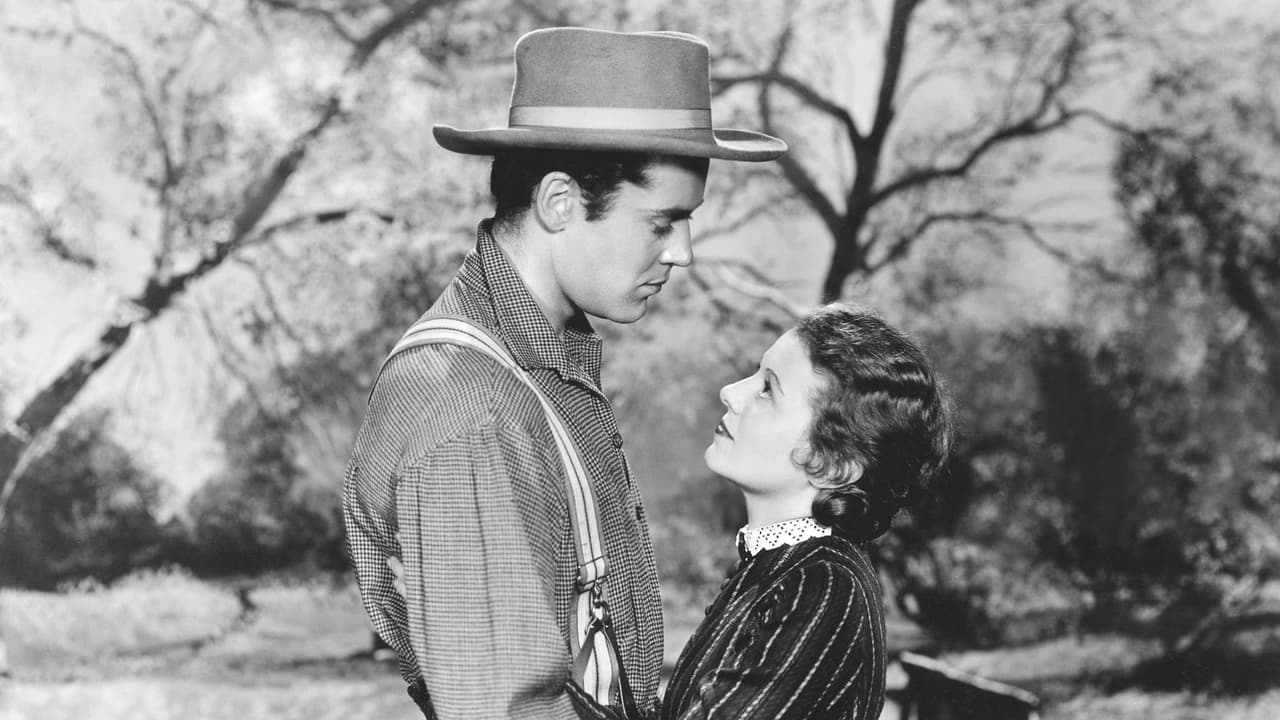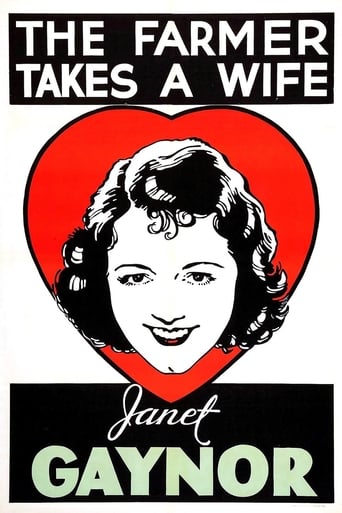PlatinumRead
Just so...so bad
Merolliv
I really wanted to like this movie. I feel terribly cynical trashing it, and that's why I'm giving it a middling 5. Actually, I'm giving it a 5 because there were some superb performances.
Fairaher
The film makes a home in your brain and the only cure is to see it again.
Janae Milner
Easily the biggest piece of Right wing non sense propaganda I ever saw.
mark.waltz
The Erie Canal is the setting for this delightful slice-of-life drama that involves the romance between the cook on a barge (Janet Gaynor) and the farmer (Henry Fonda) she falls in love with. She's the target of the volatile Charles Bickford's unwanted affections and suffers a ton in order to realize it's Fonda she is meant to be with. Bickford is one of the most despicable bullies in film history, a character so vile you might find yourself hissing at him. In addition to Fonda (his film debut here), a ton of character performers also appeared in that year's "Way Down East" which takes melodrama to an entirely different level. Margaret Hamilton plays a much nicer character here than she did in "Way Down East", the type you'd later expect Marjorie Main to be playing, sort of a thinner Tugboat Annie. Andy Devine and Slim Summerville also would go on to appear in that film as well. Not as bratty as her recent "Bright Eyes" terror, Jane Withers is still pretty feisty.Under Victor Fleming's tough direction, this is memorable for its boat race towards the end of the film and certainly a manly man's film. Fonda's character (which he originated on stage) is the archetype for practically every role he'd play, the quiet everyman who must step up to the plate and show that underneath his seemingly docile nature is a force of nature ready to explode when the bully pushes him too far. It is a far cry from its musical remake which almost seems like an entirely different story.
F Gwynplaine MacIntyre
"The Farmer Takes a Wife" is remembered as Henry Fonda's film debut. He had previously starred in this story as a Broadway play. Reportedly, when Fonda met this film's director (Victor Fleming) for the first time during pre-production, Fonda asked Fleming why so many scenes featured a woman named Dolly who never said anything. Fonda then showed Fleming a line in the shooting script: "Dan and Molly cross the field. Dolly with them." He didn't know that this refers to a camera's dolly shot!The film and play are based on a novel by Walter D Edmonds, who specialised in novels about the early history of the United States. Here, we're on the Erie Canal in 1853. For nearly 30 years, the river people have prospered from the canal, which enabled easy transport between New York City and the Great Lakes. But now the railroads are coming, and the river barges may become obsolete...This film splendidly conveys that transitional moment in history, with only a few historic errors (Amerindians in New York State didn't wear Sioux war bonnets) and a few awkward examples of phony prole dialogue: I doubt that anyone ever actually referred to Utica as "Yoot-ickey".Fonda and Janet Gaynor give excellent performances, with splendid chemistry between them. Slim Summerville gives an astonishingly nuanced performance, and even perennial scene-chewers Charles Bickford and Jane Withers are good here.Margaret Hamilton, who was in the Broadway play with Fonda, repeats her stage role here: for once, she portrays a sympathetic character. I never thought I'd describe Hamilton as "pretty", but in this movie -- wearing a frilly gingham frock and an elaborate hairstyle -- she seems almost attractive for once.SLIGHT SPOILERS. There's one wince-worthy scene in this film (it wasn't in the novel or the play) when the bargees meet touring actor Junius Brutus Booth and his 15-year-old son John Wilkes Booth. The boy reads a newspaper article about a rising politician named Abraham Lincoln, and vows to become just as famous one day. Here's the truth: although Junius Booth toured with his elder son Edwin, younger son John Wilkes was kept home in Virginia ... and this is one reason why, in adulthood, the embittered John Wilkes Booth was inspired to commit the assassination that would make him more famous than his brother and their father.I also cringed at a scene when Andy Devine calls out to Janet Gaynor and she asks who's there. (Their characters have already met.) Devine had one of the most distinctive (and most annoying) voices in Hollywood, so Gaynor shouldn't have to ask him to identify himself.My all-time favourite character actress, Eily Malyon, is seen here in a very brief role ... and she actually sings, for perhaps the only time in her long acting career.There are many delights in this movie; I only regret that this is one more film in which a man must prove his manhood by getting into a brawl. I'll rate 'The Farmer Takes a Wife' 9 out of 10.
bkoganbing
When The Farmer Takes A Wife completed its run of 104 performances on Broadway in 1934 it was readily seen as a tailor made property for the number one star on the Fox Film's lot, Janet Gaynor. She specialized in playing sweet and rustic rural girls both on the silent and talking film.But when Winfield Sheehan could not get either Gary Cooper or Joel McCrea to play the male lead, he took the unusual step of hiring the actor who originated the part on Broadway. And that boys and girls is how Henry Fonda became a motion picture star.Even with Gaynor getting first billing, the accent here is on Fonda's character, a farm kid who's working on the Erie Canal in its last days because the railroad is coming through. Fonda just wants to earn enough money for good piece of farm land, not unlike Gary Cooper's Sergeant York character before he went to war. He's not into the Canal and what it's meant to the history and economy of upstate New York, in fact the whole Northeast of the USA.Gaynor and most of the rest of the cast depend on the canal for a living and they don't like progress. But she does like Fonda, prefers him in fact to another Erie Canal boat pilot, Charles Bickford who plays a real lout. You know he and Fonda will tangle.The Farmer Takes A Wife made Fonda both a stage and screen star, unusual for one work to accomplish both. But on the screen it also type cast Fonda into playing rustics for years. Think about all the roles he had in his early days. His next film was a sound remake of Way Down East, after that he did The Trail Of The Lonesome Pine, Slim, Chad Hanna which was based on a novel by Walter Edmonds just as The Farmer Takes A Wife was. Even his acclaimed parts for John Ford in The Grapes Of Wrath, Drums Along The Mohawk, and Young Mr. Lincoln fall in this same vein. After almost 80 years, The Farmer Takes A Wife still holds up well as a drama. This is a quintessential Janet Gaynor film and if a young viewer didn't know Henry Fonda became a major star because of this film, they'd guess it right away.
Single-Black-Male
The 30 year old Henry Fonda made his screen debut in this film where he delivers a fairly mediocre performance. His voice is always the same and he's still as stiff and one dimensional as he went on to become as an old man on the screen, but there is activity in his face which redeems him as a screen actor.

